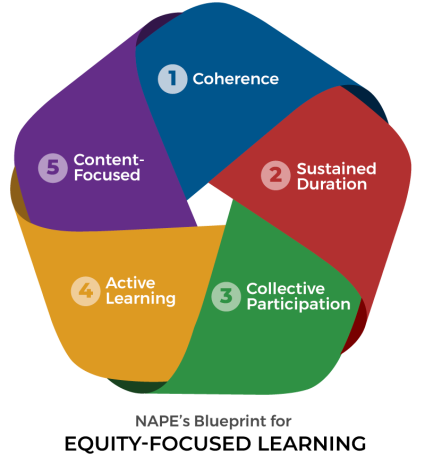At NAPE, we are committed to making a lasting and equitable impact on students through educator professional learning. As we pause to reflect on our work, we ask ourselves these important questions:

Change doesn’t happen overnight. While being introduced to information and concepts can happen in a one-hour workshop, changing beliefs, practices, and behaviors requires substantial time. Research shows that professional learning needs to take place over an extended period—often lasting six to twelve months or more—to allow educators time to practice new strategies and reflect on their learning (Bezrukova et al., 2016; Dobbin et al., 2018). NAPE’s year-long programs are designed with this in mind, providing teachers with ongoing opportunities to implement equitable practices and receive feedback, helping to ensure lasting change in the classroom.
NAPE’s long-term professional learning programs include peer observations, Professional Learning Communities (PLCs), Action Research for Equity Projects (AREPs), and other forms of coaching that are part of a cycle of inquiry. It is the sustained duration of these programs that allows for participants to practice implementing equitable practices that impact students
Learning together is powerful and critical to changing systems where students can experience equitable outcomes beyond one or two committed educators. Professional learning is more effective when educators collaborate in teams, sharing their experiences and learning with one another. NAPE builds networks of educators who engage in professional learning communities (PLCs) and other collaborative activities, fostering a supportive environment where they can tackle challenges and share successes. Our Academies are a great example of how cohorts of educators move through stages of learning together and remain connected for extended periods of time.
For example, if teachers struggle to find meaning in how institutional racism and sexism relate to their own lives, they will find it infinitely harder to do this effectively for students. NAPE curriculum asks educators to do the uncomfortable work of unpacking their own complex identities and positionality to privilege and oppression, individually and in community with peers. Specifically, teachers have opportunities to ask questions about their lives, teaching practices, and classrooms in a setting that is supportive and encourages growth.
Effective professional learning engages educators in hands-on, inquiry-based learning rather than passive listening (Darling-Hammond, 2017). Our professional learning sessions involve group activities, modeling effective practices, reflection, and real-life scenarios that educators can relate to. We emphasize interactive self-discovery, encouraging educators to reflect on their own identities and biases and to practice new skills and strategies in a safe, supportive environment.
Because NAPE provides professional learning rooted in diversity, equity, inclusion, and justice, our instructors are skilled at creating structure, safety, and self-management in the face of challenge or conflict. NAPE’s instructors come with a wealth of knowledge in their content areas, as well as lived experiences that position them to speak to issues of identity across differences. NAPE instructors have years of experience facilitating complex discussions using community values and research-based approaches to managing participant growth and discomfort around topics of identity, inequity and systems of oppression.
Finally, our professional learning programs tie directly to the specific content educators are teaching. Whether it’s STEM or Career and Technical Education (CTE), our instructors help educators integrate equity-focused strategies into their subject areas. We emphasize inquiry-based learning that challenges traditional teaching methods and empowers both educators and students to critically engage with the content.
Again, inquiry here is essential. One would not ask the same kinds of questions in science, auto mechanics, or English Language Arts. Some equity-based professional learning primarily focuses on providing information about issues like the gender gap in STEM or reading about famous women in science. Other such professional learning focuses on some general “best practices” teachers and faculty can be aware of in their own classrooms to support equity, such as focusing on the proportion of time spent calling on boys/men, girls/women/femmes, and trans and nonbinary students, different types of questions and praise, and increasing wait time after asking questions. All of this professional development promotes general (not content-specific) practices that allow marginalized students some space to enter the fields of science, mathematics, and technology. They do not, however, fundamentally change the ways we ask questions, study, and draw conclusions about the world around us. Therefore, they do not challenge the relationships that students develop with STEM and CTE.
Inquiry has the potential for changing educators’ and students’ relationships because it is content-specific and because it questions embedded inequitable practices. To move beyond providing educators with toolkits and assessing their implementation of specific classroom strategies, NAPE’s professional learning addresses educators’ attitudes about what education is for and the power of their role as educators in working towards a more socially just world.
By integrating these principles into our professional learning programs, we aim to create meaningful, lasting change in classrooms across the country. Educators leave our programs not only with new tools and strategies but also with a deeper understanding of their role in fostering equity and inclusion for all students. At NAPE, we would love to partner with you to develop your professional development goals, to learn more about our suite of professional learning offerings and request a meeting, visit https://napequity.org/professional-development/.
Join us on Oct. 30 for our “Facilitating Equitable Learning Environments” webinar and learn more about our newest professional development offering! Click here to learn more.
Bezrukova, K., Spell, C. S., Perry, J. L., & Jehn, K. A. (2016). A meta-analytical integration of over 40 years of research on diversity training evaluation. Psychological Bulletin, 142(11), 1227–1274.
Borko, Hilda. (2004). Professional Development and Teacher Learning: Mapping the Terrain. Educational Researcher, Vol. 33, No. 8, pp. 3–15.
Darling-Hammond, L., Hyler, M. E., Gardner, M. (2017). Effective Teacher Professional Development. Palo Alto, CA: Learning Policy Institute.
Dobbin, Frank & Kalev, Alexandra. (2018). Why Doesn’t Diversity Training Work? The Challenge for Industry and Academia. Anthropology Now, 10:48–55.